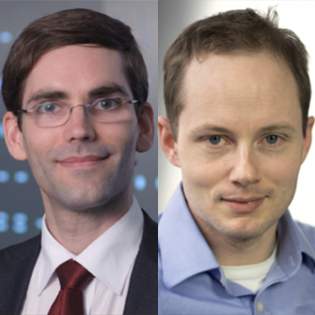Palacios promoted to Full Professor; Englund promoted to Associate Professor without tenure
 The Department of Electrical Engineering and Computer Science announced the promotions of Tomás Palacios and Dirk Englund to Associate Professor without Tenure on February 8, 2016. The promotions are effective July 1.
The Department of Electrical Engineering and Computer Science announced the promotions of Tomás Palacios and Dirk Englund to Associate Professor without Tenure on February 8, 2016. The promotions are effective July 1.
Tomás Palacios, Full Professor
Tomás Palacios has made groundbreaking contributions to electron devices through the use of new materials and nanotechnology. His work includes both advancing the design, fabrication and application of semiconductors such as GaN, ubiquitous in today's solid state lighting and power electronics, as well as developing some of the first device concepts and applications of graphene and other two-dimensional materials. In addition to leading endeavors such as the MIT GaN Energy Initiative, Palacios has made important contributions to our undergraduate classes from freshman through senior levels, and has taken on prominent service activities such as the directorship of the EECS VI-A program.
Dirk Englund, Associate Professor without Tenure
Dirk Englund researches the development of photonic and quantum devices and systems and their use in quantum computation, communications, and sensing. Quantum-based approaches have promise for revolutionary impact on computation, secure communications, high-precision sensing, and many other areas. Among other advances, Dirk has made important contributions in each of quantum and photonic devices, quantum information processing, quantum communications, and quantum sensing, and he has become widely recognized for his work in these areas. Englund has also been making valuable educational contributions to the department, including introduction of a new combination undergraduate and graduate course, "Fundamentals of Photonics."
We offer our sincere congratulations to Prof. Palacios and Prof. Englund!
--Microsystems Technology Laboratories (with thanks to Audrey Resutek, EECS)